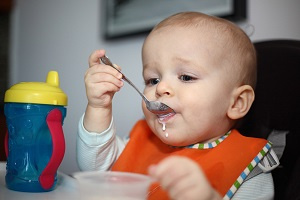Food allergies are becoming more common. Here we look at how to spot the signs of an allergy, help your child and cope emotionally.
What are food allergies?
An allergy is when your body has an immune reaction to a particular food or substance within minutes of eating it (Spector, 2022; Allergy UK, 2021a). This abnormal immune response may take years to develop, so it doesn't always happen the first time we come into contact with something.
Allergies are common in the UK, particularly among children (NHS, 2021). Some allergies will go away as a child gets older, while others are lifelong (NHS, 2021).
There is often confusion between allergies and food intolerance. A food intolerance is when a person has trouble digesting a specific food, which may take up to a couple of days for a person to notice (NHS, 2021; Spector, 2022). You can read more about food intolerances in babies in our article here.
What are the most common food allergies?
The most common foods that cause allergic reactions are cow's milk, nuts, eggs, foods containing gluten (e.g. wheat), seeds, soya, fish and shellfish (NHS, 2021).
Most allergies are mild but some can cause a severe allergic reaction, and they tend to become more severe with each exposure to the substance. Trying to figure out whether a child has an allergy can be difficult, so it’s good to be aware of the signs. It’s also good to keep in mind that some symptoms could indicate another issue like a food intolerance or they could be something else entirely (NHS, 2019a).
What are the symptoms of an allergy?
Symptoms might include one or more of the following:
- itchy skin or rash
- swollen lips and throat
- runny or blocked nose
- sore, red itchy eyes
- cough
- vomiting
- diarrhoea.
(NHS, 2021)
If you think your child has an allergy, you could talk to your GP about their symptoms.
What is anaphylactic shock?
Occasionally, an allergy can lead to a severe allergic reaction, called anaphylaxis, which can be life threatening. This affects the whole body and usually develops within minutes of coming into contact with something the person is allergic to.
The symptoms of anaphylactic shock come on and worsen quickly. Its symptoms might include those listed above, as well as:
- feeling lightheaded or faint
- clammy skin
- difficulty breathing
- wheezing
- a fast heartbeat
- collapsing or losing consciousness
- confusion and anxiety.
(NHS, 2019b)
Call 999 immediately if you suspect anaphylactic shock.
Reaction to cow's milk
Some babies react to cow's milk. They might have either an allergic reaction or an intolerance to the protein in cow's milk, or an intolerance to lactose, the sugar in cow's milk (Walsh et al, 2016).
Cow's milk protein allergy (CMPA) is one of the most common childhood food allergies but it’s still rare (Allergy UK, 2021b). An estimated two to eight in 100 babies up to one year old have a suspected CMPA. Half will have grown out of it by the end of their first year and eight or nine in ten have grown out of it by the age of five years old (Caffarelli et al, 2010).
Symptoms of the allergy (see above) might show up straight after a feed or they may be delayed. This is known as immediate and delayed CMPA. Occasionally, CMPA can cause a severe allergic reaction or anaphylaxis (see symptoms above), which is a medical emergency – call 999.
Babies sometimes develop CMPA when they first consume cow's milk in their diet, either in formula or when they start eating solids (NHS, 2019c). CMPA can also, occasionally, affect exclusively breastfed babies as cow's milk from the mum’s diet can pass to their baby (NHS, 2019c).
If a baby has a CMPA and is formula fed, parents often find their health professional suggests a hydrolysed formula. In this formula, the cow's milk protein is already partially digested. You don’t need a prescription, and nine out of ten babies find this easier to digest (Cafferelli et al, 2010). If that doesn't work, you can get prescription formulas that don’t contain cow's milk.
It is useful to remember that between 2006 and 2016, prescriptions of specialist infant milk for CMPA increased dramatically, despite no evidence of a real increase in milk allergy (Spector, 2022). Overdiagnosis is potentially harmful to mums and babies and might confuse parents (Spector, 2022).
Going dairy-free
Mums who exclusively breastfeed a baby who is allergic to cow's milk might be advised to exclude dairy products from their diets (NHS, 2019c). A dairy-free diet can seem overwhelming but your GP can refer you to a dietician who will make sure you don’t miss out on eating vital nutrients.
Nut allergies
Allergies to nuts, nut products and some seeds affect one in 50 people (Allergy UK, 2021a).
Your child has a higher risk of developing a peanut allergy if they already have an allergy, like eczema or a diagnosed food allergy (NHS, 2021). There’s also more chance if there’s a history of allergies in their immediate family, including asthma, eczema or hay fever (NHS, 2021).
If you’re concerned about a potential allergic reaction, it’s worth talking to your GP or health visitor. They might be able to offer advice or reassurance.
If your child does have a nut allergy, avoid giving them food that contains peanuts, including peanut butter and peanut oil. Also, it’s important to read food labels carefully before giving them any snacks (NHS, 2021). Pre-packed food often has a list of ingredients with possible allergens written in bold, italic or coloured type to make the ingredients easier to spot (Food Standards Agency, 2021).
While lots of children outgrow allergies to milk or eggs, a peanut allergy tends to be lifelong (NHS, 2021).
How can I lower the chance of my child developing an allergy?
The advice from the World Health Organization is to exclusively breastfeed babies until the age of six months (WHO, 2002). There is evidence to suggest this can reduce the risk of allergies (UNICEF, no date). See our article here for more information about the benefits of breastfeeding.
When introducing your baby to solids, it’s a good idea to introduce new foods slowly. Offer milk, eggs, gluten (including wheat), nuts, seeds, soya, shellfish and fish one at a time and in small amounts. That’ll mean you can spot potential reactions (NHS, 2021).
Allergy UK has a downloadable fact sheet about weaning your baby when you’re introducing foods that can be associated with allergies.
Allergic reaction – what’s next?
If you think your child has had an allergic reaction, you could see your GP. They can help to determine whether it’s likely to be an allergy or something caused by another condition.
Your GP also can offer advice and treatment to manage the allergy. If it’s severe or hard to tell what’s causing the reaction, they might refer you to an allergy specialist for testing or treatment advice.
To confirm an allergy, a specialist will conduct a range of assessments, including a physical examination, history-taking, blood tests and food challenge (Spector, 2022). Any of these without the others can be misleading (Spector, 2022). It could be tempting to seek an alternative to a medical doctor but it's good to remember that other tests are unregulated (Spector, 2022).
How to cope emotionally
Allergies can at times be worrying, frustrating, stressful and restrictive.
While it can be tough for parents and little ones alike, it’s good to remember most allergies are mild and they can be managed.
Food manufacturers are getting better at catering for people with food allergies, so there’s more choice of dairy-free, lactose-free or nut-free foods available. On your doctor’s advice, your baby might be prescribed different types of baby formula milk if they have allergies to a certain type of milk (NHS, 2019d).
If you’re concerned about your child’s health or think they may have an allergy or food intolerance, your GP should be able to help. There is information and support available if you need it (see below). You can also see our article about one mum's experience with her child's food allergies and reflux.
This page was last reviewed in December 2021.
Further information
Our support line offers practical and emotional support with feeding your baby and general enquiries for parents, members and volunteers: 0300 330 0700.
You might find attending one of our NCT New Baby courses helpful as they give you the opportunity to explore different approaches to important parenting issues with a qualified group leader and other new parents in your area.
Make friends with other parents-to-be and new parents in your local area for support and friendship by seeing what NCT activities are happening nearby.
For further information and support about allergies, you can see the Allergy UK website or call their helpline on 01322 619898.
Allergy UK. (2021a) Childhood food allergy. Available at: https://www.allergyuk.org/information-and-advice/conditions-and-symptom… [Accessed 16th December 2021]
Allergy UK. (2021b) Cow’s milk allergy. Available at: https://www.allergyuk.org/information-and-advice/conditions-and-symptom… [Accessed 16th December 2021]
Caffarelli C, Baldi F, Bendandi B, Calzone L, Marani M, Pasquinelli P; EWGPAG. (2010) Cow's milk protein allergy in children: a practical guide. Ital J Pediatr. 36:5. Available at: https://www.ncbi.nlm.nih.gov/pmc/articles/PMC2823764/ [Accessed 16th January 2022]
Food Standards Agency. (2021) Food allergy and intolerance. Available at: https://www.food.gov.uk/safety-hygiene/food-allergy-and-intolerance [Accessed 16th December 2021]
NHS. (2019a) Food intolerance. Available at: https://www.nhs.uk/conditions/food-intolerance/ [Accessed 16th December 2021]
NHS. (2019b) Anaphylaxis. Available at: https://www.nhs.uk/conditions/anaphylaxis/ [Accessed 16th December 2021]
NHS. (2019c) What should I do if I think my baby is allergic or intolerant to cows milk? Available at: https://www.nhs.uk/common-health-questions/childrens-health/what-should… [Accessed 16th December 2021]
NHS. (2019d) Types of formula milk. Available at: https://www.nhs.uk/conditions/baby/breastfeeding-and-bottle-feeding/bot… [Accessed 16th December 2021]
NHS. (2021) Food allergies in babies and children. Available at: https://www.nhs.uk/conditions/baby/weaning-and-feeding/food-allergies-i… [Accessed 16th December 2021]
Spector T. (2022) Spoon Fed, Why Almost Everything We’ve Been Told About Food is Wrong. London: Vintage.
UNICEF. (no date) Allergies: infant health research. Available at: https://www.unicef.org.uk/babyfriendly/news-and-research/baby-friendly-… [Accessed 16th December 2021]
Walsh J, Meyer R, Shah N, Quekett J, Fox AT. (2016) Differentiating milk allergy (IgE and non-IgE mediated) from lactose intolerance: understanding the underlying mechanisms and presentations. Br J Gen Pract. 66(649):e609–e611. Available at: https://www.ncbi.nlm.nih.gov/pmc/articles/PMC4979917/ [Accessed 16th January 2022]
WHO. (2002) Global strategy on infant and young child feeding. Available at: http://apps.who.int/gb/archive/pdf_files/WHA55/ea5515.pdf [Accessed 16th January 2022]








